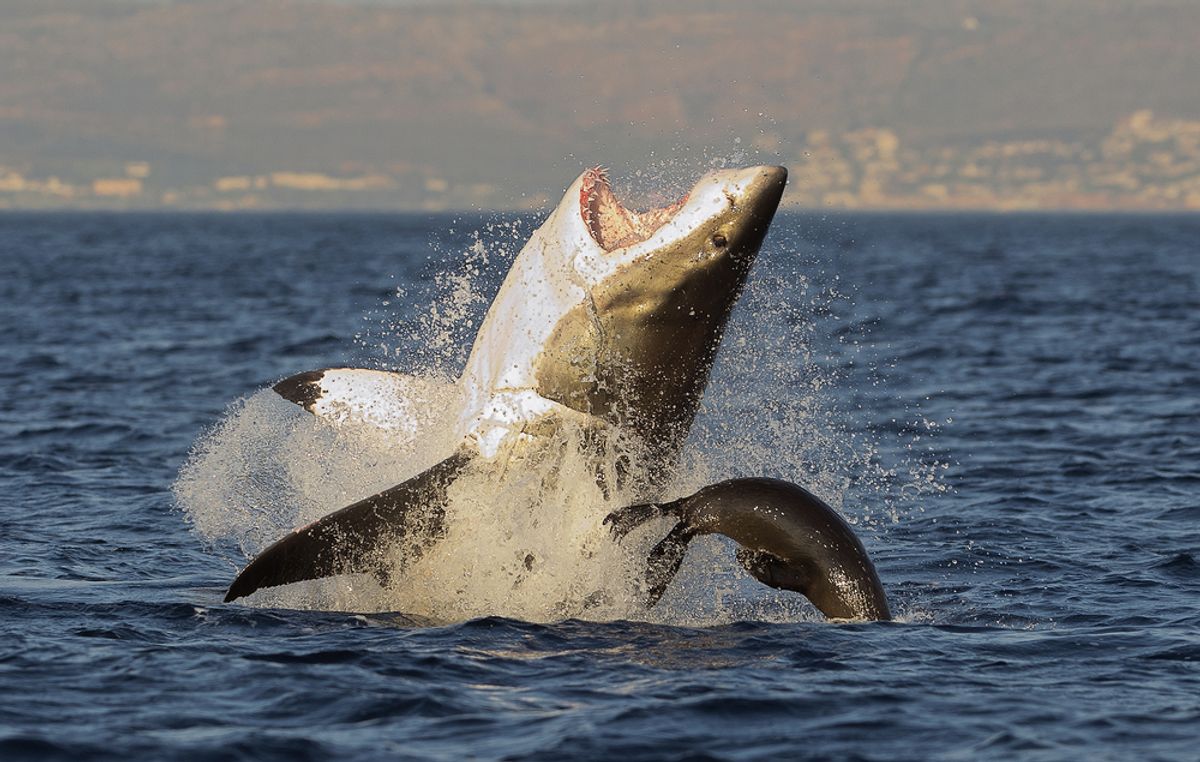Shark Week, Discovery Channel's week of block programming devoted to the famous marine predator, is now officially the longest-running cable event in history. It has garnered spoofs and adoration, from Comedy Central's Shart Week to "30 Rock's" Tracy Jordan giving the immortal advice: "Live every week like it's Shark Week."
But with all its hype, the tradition has received fervent criticism for its penchant for the gruesome and sensational, while all but neglecting scientific truth.
The 2013 piece "Megalodon: The Monster Shark that Lives" was the first to really rile dissenters. The show followed a troop of explorers attempting to prove the existence of the Carcharocles megalodon, a prehistoric 50-foot-long shark that had allegedly been wreaking havoc throughout the high seas. It was complete fiction. It also saw 4.8 million viewers, the largest audience of any show in the history of Discovery's programming. In response to enormous backlash, Shark Week's executive producer Michael Sorensen said in a statement, "It's one of the most debated shark discussions of all time [it isn't], can Megalodon exist today [it can't]? It's Ultimate Shark Week fantasy. The stories have been out there for years, and with 95 percent of the ocean unexplored, who really knows? [Everyone. We all know.]"
The original airing featured three disclaimers, including one that read, "None of the institutions or agencies that appear in the film are affiliated with it in any way, nor have approved its contents." So are we wrong to feel outraged that it was all fiction? Even though they were [kind of] clear about it?
In a blog post on National Geographic, Brian Switek argues that our outrage is warranted:
Discovery built its reputation with science programming. Shark Week was always a high point. There was no part of the summer I looked forward to more. As a kid, I was hooked by shows that gave shark experts such as Eugenie Clark, John McCosker, and Samuel Gruber full attention as the researchers rhapsodized about the selachian subjects of their scientific fascination...But now Discovery is a joke, with the megalodon fiasco only being a confirmation of what has been clear for some time.
It's as if the New York Times' front page suddenly forayed into fiction. How were we supposed to know they had decided to change their mission?
This year's Shark Week programming, which premiered on Sunday evening, follows in the footsteps of "Megalodon" -- with lots of gore and hearsay, but not much science. Only two programs (out of 29) actually feature scientists in the description, and all the others focus on mythical killing machines, which most certainly do not exist. The event has even sparked a bevy of restaurants offering shark meat promotions, to the total dismay of real conservationists and researchers.
Even when trustworthy authorities do appear on Shark Week, we can't trust that they endorse the message of whatever show they are on. According to io9, scientists have been lied to by Shark Week producers to get them to appear in various specials. Jonathan Davis was studying bull sharks for his master's thesis, when he was approached by producers: "I asked a few of the crew members, including the producer, what the show was going to be about ... I was just told it would be combined with some other filming to make one show about Louisiana shark research." It was actually featured in something called "Voodoo Shark," about a mythical monster that lived in the Louisiana Bayous.
In an interview with the Atlantic's Ashley Fetters, Shark Week's former executive producer Brooke Runnette outlined Shark Week's programming strategy:
To a large extent, she says, the ominous tones and the imminent danger are still what draws viewers to Shark Week. In the past 25 years, Runnette and her team managed to isolate "what works" into a neat, distilled list of elements: "The shark is the star. Just keep showing that. Don't give too much reason to worry. Make sure we stay outside, because it's summertime, and everybody wants to see the colors and the light outside. You don't want to be inside talking to people; if anything, you want to be outside talking to people. Just be in the water, with the shark; or be out on the boat, with the shark."
It's a classic story of modern media -- when clicks and views mean success, accuracy and quality become unnecessary bonuses. We just need to stop being surprised when it happens.

Shares